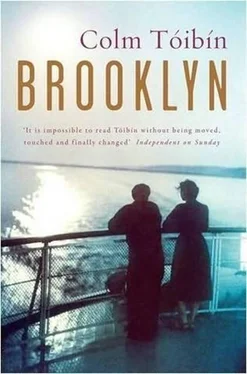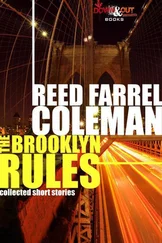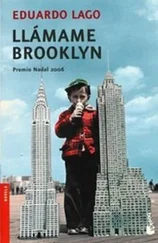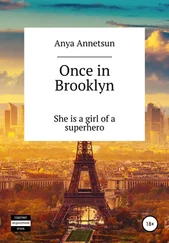"Well, I wish you would take a few of the others with you," Mrs. Kehoe said. "I won't name them or anything, but it's the one day of the year I like a bit of peace. Indeed, I might end up presenting myself to you and Father Flood as a person in need. Just to get a bit of peace."
"I'm sure you would be very welcome, Mrs. Kehoe," Eilis said, and then, having realized how offensive that remark might sound, added quickly as Mrs. Kehoe glared at her: "But of course you'll be needed here. And it's nice to be in your own house for Christmas."
"I dread it, to be honest," Mrs. Kehoe said. "And if it wasn't for my religious convictions, I'd ignore it like the Jews do. In parts of Brooklyn, it could be any day of the week. I always think that's why you get a biting cold on a Christmas Day, to remind you. And we'll miss you now for the dinner. I was looking forward to having a Wexford face."
One day as she was walking to work, crossing State Street, Eilis saw a man selling watches. She was early for work and so had time to linger at his stand. She knew nothing about types of watches but thought the prices were very low. She had enough money in her handbag to buy one for each of her brothers. Even if they already had watches-and she knew that Martin wore her father's watch-these could serve them if the old ones broke or had to be repaired, and they were from America, which might mean something in Birmingham, and they would be easy to package and cheap to send. In Loehmann's one lunchtime she found beautiful angora wool cardigans that cost more than she had in mind, but she came back the next day and bought one for her mother and one for Rose and wrapped them together with the nylon stockings she had bought on the sale and sent them to Ireland.
Slowly, Christmas decorations began to appear in the stores and streets of Brooklyn. After supper one Friday evening, when Mrs. Kehoe had left the kitchen, Miss McAdam wondered when Mrs. Kehoe would put up the decorations.
"Last year she waited until the last minute, and that took all the good out of it," Miss McAdam said.
Patty and Diana were going to stay near Central Park, they said, with Patty's sister and her children and have a real Christmas, with presents and visits to Santa Claus. Miss Keegan said that it was not really Christmas if you were not in your own house in Ireland, and she was going to be sad all day and there was no point in pretending that she wouldn't be.
"Do you know something?" Sheila Heffernan interjected. "There's no taste off American turkeys, even the one we had at Thanksgiving tasted of nothing except sawdust. It isn't Mrs. Kehoe's fault, it's the same all over America."
"All over America?" Diana asked. "In every part?" She and Patty began to laugh.
"It'll be quiet anyway," Sheila said pointedly, glancing in their direction. "We won't have so much useless chatter."
"Oh, I wouldn't bet on that," Patty said. "We might come down the chimney to fill your stocking when you're least expecting us, Sheila."
Patty and Diana both laughed again.
Eilis did not tell any of them what she was doing for Christmas; at breakfast one day the following week, however, it was clear that Mrs. Kehoe had told them.
"Oh, God," Sheila said, "they take in every oul' fella off the street. You'd never know what they'd have."
"I heard about it all right," Miss Keegan said. "They put funny hats on the down and outs and give them bottles of stout."
"You're a saint, Eilis," Patty said. "A living saint."
At work Miss Fortini asked Eilis if she would stay on late in the evenings in the week before Christmas and she agreed, as the college had closed for a two weeks' holiday. She also agreed to work Christmas Eve up to the very last minute, since some of the other girls on the floor wanted to leave early to catch trains and buses and be with their families.
When she finished at Bartocci's on Christmas Eve she went directly as arranged to the parish hall so that she could take instructions for the next day. Long tables were being carried in from a truck parked outside, followed by benches. She had heard Father Flood before mass asking some women to lend him tablecloths that they could then retrieve when Christmas was over. After his sermon he had asked for donations of cutlery and glasses and cups and saucers and plates to add to his store. He also made clear that the parish hall would be open from eleven in the morning until nine in the evening on Christmas Day and anyone passing, irrespective of creed or country of origin, would be welcome in God's name; even those not in need of food or refreshment could drop by at any time to add to the day's cheer, but not, he added, between twelve thirty and three, please, when Christmas dinner would be served. He also announced that, beginning in the middle of January, he was going to run a dance in the parish hall every Friday night with a live band but no alcohol to raise funds for the parish and he would like everyone to spread the word.
As soon as Eilis had pushed past the men setting the tables and benches down evenly in rows and women hanging Christmas decorations from the ceiling, she saw Father Flood.
"I wonder would you count the silverware to make sure we have enough?" he said. "Otherwise, we'll have to go out into the highways and byways."
"How many are you expecting?"
"Two hundred last year. They cross the bridges, some of them come down from Queens and in from Long Island."
"And are they all Irish?"
"Yes, they are all leftover Irishmen, they built the tunnels and the bridges and the highways. Some of them I only see once a year. God knows what they live on."
"Why don't they go back home?"
"Some of them are here fifty years and they've lost touch with everyone," Father Flood said. "One year I got home addresses for some of them, the ones I thought needed help most, and I wrote to Ireland for them. Mostly, I got silence, but for one poor old divil I got a stinker of a letter from his sister-in-law saying that the farm, or the homestead, or whatever it was, wasn't his, and he wasn't to think of ever setting foot in it. She'd scatter him at the gate. I remember that. That's what she said."
Eilis went to midnight mass with Mrs. Kehoe and Miss Keegan, discovering on the way home that Mrs. Kehoe was among the parishioners who were roasting a turkey and potatoes and boiling a ham for Father Flood, who had arranged for it all to be collected at twelve.
"It's like the war," Mrs. Kehoe said. "Feeding the army. Has to be done like clockwork. I'll carve what our own small needs will be from the turkey, the biggest one I could get, it'll be six hours in the oven, before I send it off. And we'll eat, just the four of us, myself, Miss McAdam, Miss Heffernan and Miss Keegan here, as soon as the turkey is off our hands. And if there's anything left over, we'll save it for you, Eilis."
By nine o'clock Eilis was in the parish hall peeling vegetables in the big kitchen at the back. There were women working beside her whom she had never met before, all of them older than she, some with faint American accents but all of Irish origin. Most of them were just here for this part of the morning, she was told, before going home to feed their families. Soon it became clear that two women were in charge. When Father Flood arrived he introduced Eilis to them.
"They are the Miss Murphys from Arklow," he said. "Though we won't hold that against them."
The two Miss Murphys laughed. They were tall, cheerful-looking women in their fifties.
"It'll be just the three of us," one of them said, "here all day. The other helpers will come and go."
"We're the ones with no homes to go to," the other Miss Murphy said and smiled.
"Now, we'll feed them in sets of twenty," her sister said.
"Each of us prepares sixty-five dinners, it might even be more, in three sittings. I'm in Father Flood's own kitchen and the two of you are here in the hall. As soon as a turkey arrives, or when the ones we have cooking upstairs are ready, Father Flood will attack them and the hams and carve them. The oven here is just for keeping things hot. For an hour people will bring us turkeys and hams and roast potatoes and the thing is to have vegetables cooked and hot and ready to be served."
Читать дальше












